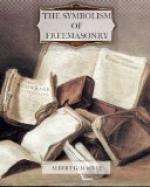MYTH. Grote’s definition of the myth, which is cited in the text, may be applied without modification to the myths of Freemasonry, although intended by the author only for the myths of the ancient Greek religion.
The myth, then, is a narrative of remote date, not necessarily true or false, but whose truth can only be certified by internal evidence. The word was first applied to those fables of the pagan gods which have descended from the remotest antiquity, and in all of which there prevails a symbolic idea, not always, however, capable of a positive interpretation. As applied to Freemasonry, the words myth and legend are synonymous.
From this definition it will appear that the myth is really only the interpretation of an idea. But how we are to read these myths will best appear from these noble words of Max Mueller: “Everything is true, natural, significant, if we enter with a reverent spirit into the meaning of ancient art and ancient language. Everything becomes false, miraculous, and unmeaning, if we interpret the deep and mighty words of the seers of old in the shallow and feeble sense of modern chroniclers.” (Science of Language, 2d Ser. p. 578.).
MYTH, HISTORICAL. An historical myth is a myth that has a known and recognized foundation in historical truth, but with the admixture of a preponderating amount of fiction in the introduction of personages and circumstances. Between the historical myth and the mythical history, the distinction as laid down in the text cannot always be preserved, because we are not always able to determine whether there is a preponderance of truth or of fiction in the legend or narrative under examination.
MYTHICAL HISTORY. A myth or legend in which the historical and truthful greatly preponderate over the inventions of fiction.
MYTHOLOGY. Literally, the science of myths; and this is a very appropriate definition, for mythology is the science which treats of the religion of the ancient pagans, which was almost altogether founded on myths, or popular traditions and legendary tales; and hence Keightly (Mythol. of Ancient Greece and Italy, p. 2) says that “mythology may be regarded as the repository of the early religion of the people.” Its interest to a masonic student arises from the constant antagonism that existed between its doctrines and those of the Primitive Freemasonry of antiquity and the light that the mythological Mysteries throw upon the ancient organization of Speculative Masonry.
MYTH, PHILOSOPHICAL. This is a myth or legend that is almost wholly unhistorical, and which has been invented only for the purpose of enunciating and illustrating a particular thought or dogma.




